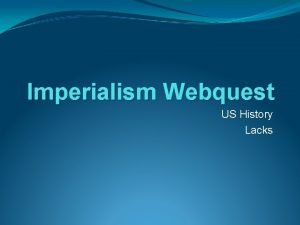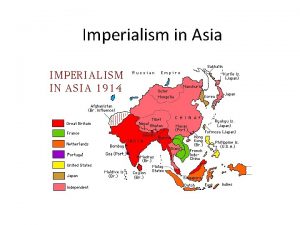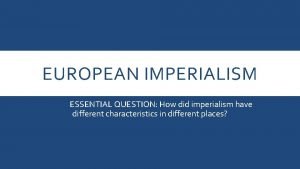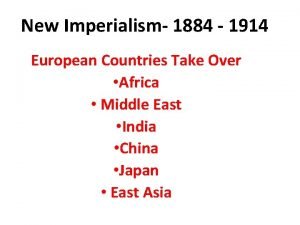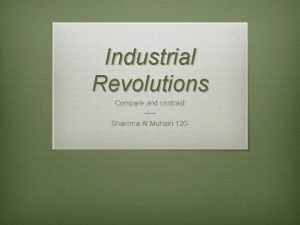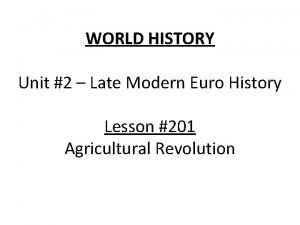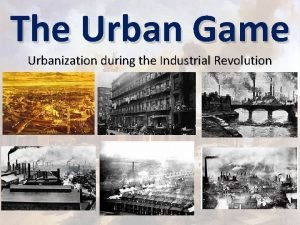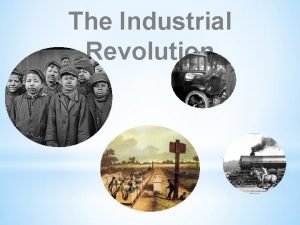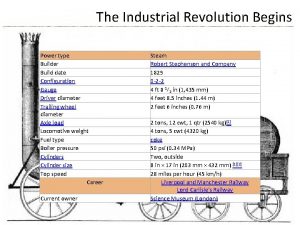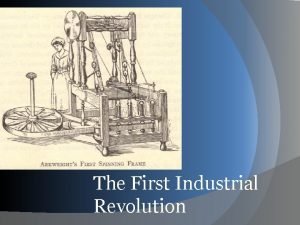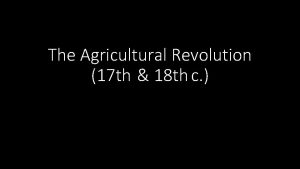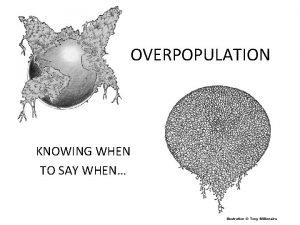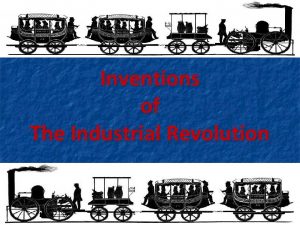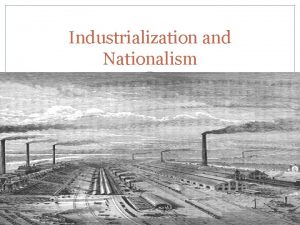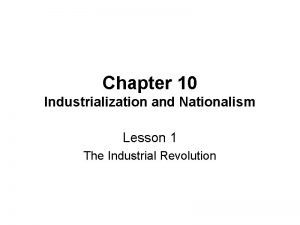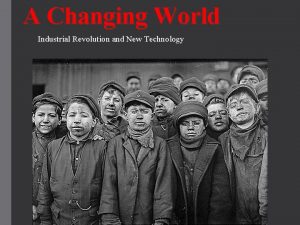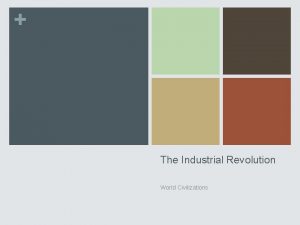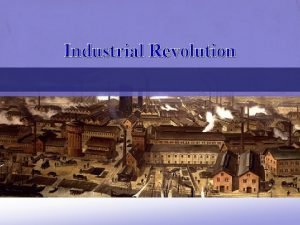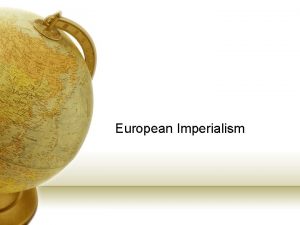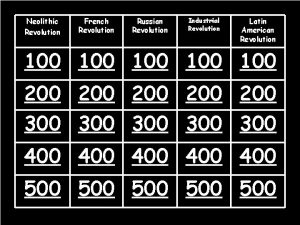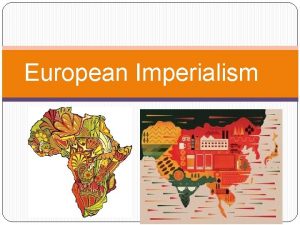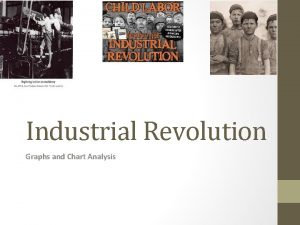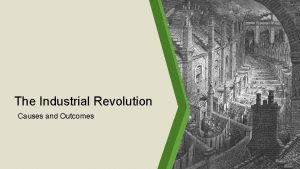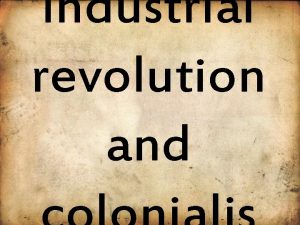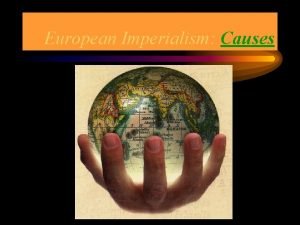European Imperialism Imperialism and the Industrial Revolution The
























































- Slides: 56

European Imperialism

Imperialism and the Industrial Revolution • The Industrial revolution brought about a great need for raw materials. • As a result many European countries began to seek raw materials from the continents of Asia, Africa, and South America. • While seeking out these raw materials the Europeans established their rule on these continents expanding an empire. (colonialism) • Western imperialism was not new; Europeans had been influencing or conquering parts of the world since the 1400’s. • Columbus • Spanish • U. S. grew from coast to coast during 1700’s.

Imperialism • Imperialism: process through which a state attempts to control the economic and/or political and cultural makeup of another state. • Colonialism: the most developed form of Imperialism whereby the controlling state invades another state/region so as to exploit its resources and/or for the purposes of large-scale • Between 1815 -1914 the West (Europe and America) increased their control of the world’s land mass from 35%-85%.

New Imperialism • Began in 1870 s colonized Asia and Africa by using military force to take control of local governments • Exploiting local economies for raw materials required by Europe’s growing industry • Imposing Western values to benefit the “backwards” colonies.

Source for Raw Materials Industrial Revolution Markets for Finished Goods European Nationalism Missionary Activity European Motives For Colonization Military & Naval Bases Social Darwinism Places to Dump Unwanted/ Excess Popul. European Racism “White Man’s Burden” Humanitarian Reasons Soc. & Eco. Opportunities

Age of Imperialism

Causes of Imperialism • Economic • Industrialization gave the West the ability to conquer other parts of the world, but more reasons to do so, too. • Large-scale industrial production made Western factories demand more raw materials, which could be seized from less powerful nations. • Also, Western nations needed markets for goods produced. • Colonies would serve as potential markets. • Immense wealth allowed Western world to conquer far-flung places.

Causes of Imperialism • Military Factors • Industrialization bestowed new weaponry of all types upon the armies and navies of the West: • Ocean-going fleets • Modern rifles and rapidfire artillery. • Occasions were rare that native populations could resist Western military forces. • Growing need of Western nations to maintain bases & coal/oil stations around the world for naval & civilian fleets. • Ships required repairs and refueling stations at strategic locations globally.

Causes of Imperialism • Social Factors • Europe’s rapid population growth during the 1800’splayed a role in prompting imperial activity. • Emigration to the Americas was an outlet. • Millions came to the Americas. • Another outlet was to leave home for colonial life. • Ambitious or desperate families attempted to make their fortunes this way.

Causes of Imperialism • Role of Science & Technology • Instrumental in allowing West to conquer & colonize. • Knowledge was power. • Advances in transportation, communication, and warfare brought by the I. R. enabled Western nations to build empires. • New wave of exploration allowed for better knowledge of the geography of the world. • Medical advances • Made possible for Euros and Americans to press into tropical regions. • Quinine helped relieve symptoms of malaria & yellow fever.

Causes of Imperialism • Cultural Factors • Sense of racial superiority was widespread among Westerners. • Created a sense that Western nations were entitled to conquer & colonize areas that appeared “backwards” or “primitive”. • Cecil Rhodes, British imperialist, “I contend that we are the finest race in the world, and the more of it we inhabit, the better. ”

Causes of Imperialism • Cultural Factors • In some cases, the belief was “justified” in crude & prejudiced ways. • In other ways, theory of social Darwinism* was used to argue in favor of imperialism. • Misguided application of “survival of the fittest” and natural selection. • People who were tech. and culturally advanced were permitted to conquer those who were less.

Causes of Imperialism • Cultural Factors • Genuine conviction that it was the duty of white Westerners to teach & modernize the darker-skinned, supposedly “primitive” peoples of Africa & Asia. • English poet Rudyard Kipling, “White Man’s Burden”. • Attitude was well-meaning and heartfelt, but also condescending. • Euro & American missionaries, doctors, and scientists, and colonial officials sometimes did much good in the places they visited. • Did so out of a subconscious sense of racial superiority, and often trampled on the beliefs and ideas of the natives.

Ideology: Nationalism and Social Darwinism • "White Man's Burden": racist patronizing that preached that the “superior” Westerners had an obligation to bring their culture to “uncivilized” peoples in other parts of the world. • Poem by Rudyard Kipling • Social Darwinism- application of Darwin’s “survival of the fittest” theory to humans

The White Man’s Burden • Poem written by Englishman Rudyard Kipling • It was the duty of the white man to bring western civilization to other lands


Social Darwinism • West had a sense of racial superiority • Darwin’s theory of “natural selection” & “survival of the fittest” applied to the human societies • Destruction & conquest of weaker races was nature’s way of improving the species

The “White Man’s Burden”?

Major Causes for New Imperialism • Search for new markets and raw materials • Missionary work: far more successful in Africa than in Asia and Islamic world. • Dr. David Livingston: first white man to do humanitarian and religious work in south and central Africa • H. M. Stanley found Livingston (whom westerners thought to be dead) and his newspaper reports created European interest in Africa; Stanley sought aid of king of Belgium to dominate the Congo region.

European Migration • Between 1815 and 1932 more than 60 million people left Europe • Migrants went primarily to Europeaninhabited areas: North and South America, Australia, New Zealand, and Siberia. • European migration provided further impetus for Western expansion • Most were poor from rural areas, though seldom from the poorest classes (due to oppressive land policies)

Western advantages • • • Strong economies Well-organized governments Powerful armed forces Superior technology and medicine Maxim gun Quinine

Colony • Governors and soldiers sent to control the people • French tried direct rule • British used indirect rule

Protectorate • Local rulers left in place • Supposed to listen to advice of mother country • Cost less to run than a colony

Sphere of influence • An outside power claimed economic (trading) privileges • China was the best example

Africa • 1880, Europeans controlled 10% of Africa • 1914 Europeans controlled all except Liberia & Ethiopia

Africa: Berlin Congress 1884 -85 • Established the "rules" for conquest of Africa • sought to prevent conflict over imperialism • Congress coincided with Germany's rise as an imperial power • Agreed to stop slavery and slave trade in Africa • Germany took control of Cameroon, Togo, southwest Africa, & East Africa • France took control Tunisia, Algeria, French West Africa (including Morocco, Sahara, Sudan, Congo basin) • Italy: took control of Libya • Belgium: Took control of the Congo

5 -8 Million Victims! (50% of Popul. ) It is blood-curdling to see them (the soldiers) returning with the hands of the slain, and to find the hands of young children amongst the bigger ones evidencing their bravery. . . The rubber from this district has cost hundreds of lives, and the scenes I have witnessed, while unable to help the oppressed, have been almost enough to make me wish I were dead. . . This rubber traffic is steeped in blood, and if the natives were to rise and sweep every white person on the Upper Congo into eternity, there would still be left a fearful balance to their credit. -- Belgian Official

Punishing “Lazy” Workers

Belgium’s Stranglehold on the Congo

Europe’s Overseas Empire • Western Approaches • Britain’s was the largest and most powerful colonial establishment. • France, Belgium, and the Netherlands also had sizable colonies. • Various approaches to governing • British considered to have most “enlightened” approach to colonization. • Did take their colonies by force & exploited them economically-and were prone to the same sense of racial superiority as the others

Africa: Berlin Congress 1884 -85 • Britain: perhaps the most enlightened of the imperialist powers (though still oppressive) • Yet, they interfered as little as possible with local customs. • Took control of Egypt in 1883 (model for "New Imperialism") • Pushed southward and took control of Sudan • Battle of Omdurman (1898): General Horatio H. Kitchener defeated Sudanese tribesman and killed 11, 000 (use of machine gun) while only 28 Britons died

Rhodes Colossus • What is the man standing over? • What is he holding? • Why would he have a rifle?

Europe’s Overseas Empires • Egypt • Perhaps most important territory was Egypt. • Became a British protectorate in 1880’s. • France & Britain both vied for Egypt, mainly b/c of the financing of the Suez Canal (1869). • Control over the canal-a vital link between Med. And Red Sea/ Indian Ocean-was crucial • British used eco. pressure to gain more political control over Egypt.

Egypt • Became a protectorate of Great Britain from 1883 until 1956 • British domination of Egypt became the model for the "new imperialism" • Turkish general Muhammad Ali had established Egypt into a strong and virtually independent state by 1849 • Egypt's inability to satisfy foreign investors led to control of its finances by France & Britain • Safeguarding the Suez Canal (completed in 1869) played a key role in the British occupation of Egypt and its bloody conquest of the Sudan.

European Imperialism 1700 s-1800 s • Other European countries scramble to set up colonies all over world • • France Belgium Germany Denmark

British Imperialism

European Interest in India • Europeans need and have a high demand for spices, cotton, and other goods • Europeans trade by land over what route? SILK ROAD

British in India • Set up trade in India • Corrupt Mogul Empire in India • ignores British gains • British soon control India • Export cotton from India to Britain • Machine cotton spinning in Britain • starts industrial revolution • British empire expands • Africa, Asia, Australia

British Rule in India • The East India Company, a British owned company, established trading post in India. 1. Establish colonies 2. Make laws and collect taxes 3. Have an army • They fought with France as well as India over control of the sub-continent. Britain won. • By 1857 the British were hiring Indian allies to protect British interest.

Sepoy Rebellion • In 1857 British forces had hired Indian soldiers known as Sepoys. • The guns issued to the Sepoys required that they bite off the end of the powder cartridge which contained beef fat. • The Sepoys refused to do so when ordered. This led to a rebellion which lasted a year. • Because of the Sepoy Rebellion The British took over complete rule of India. • Parliament appointed a viceroy( governor) to rule in India. • This caused a number of problems for the people of India.


Problems of British Rule • 1 - Indians bought cheaper cloth from Britain which destroyed Indian textiles. • 2 -The British collected taxes from the Indians to keep the army in India. This caused some farmers to lose their farms. • 3 -Britain convinced many farmer to grow cotton instead of food which led to starvation. • Educated Indians, predominantly Hindu, demanded increasing equality & self-gov't • India became independent in 1946 (just after WWII)

India was a major supplier of raw materials Indians must produce raw materials for Britain Jewel in the Crown Tea, indigo, coffee, cotton, and jute, opium Indians must buy finished goods from Britain

Why were the Indians so angry? ? • • Brits had changed traditional practices Indians Forced to buy British stuff Indians were treated as second class Not allowed to have best jobs Paid less for the same jobs as British Even educated people discriminated against Indian economy became dependent on Brits! How do you think some Indians feel about this? ?

Impact of Colonialism +Positive Results +India develops a democracy using British Legal System +3 rd largest railroad system -Negative Results -British held economic and political power +Globalizes India’s economy -Destroyed India’s self sufficiency +Unified the many regions -Restricted Indian owned industries +Telephone lines -Cash crops led to famine +Dams, bridges, canals -Racism of British people +Improved Sanitation and public -Indians treated like second class health +Improved Education and Literacy +End to local warfare citizens

A New Independence Leader!! Gandhi • Mohandas _______ has returned to India from South Africa • Why is he going to be important? • He is an Indian but British educated lawyer • He will become India’s greatest Independence leader and teach principles of non-violent protest and civil disobedience

Europe’s Overseas Empires • SE Asia • Colonized & influenced by a variety of powers. • Dutch controlled Indonesia. • Napoleon III led France into overtaking Indochina. • British controlled Burma, Malay Peninsula, and Australia. • Philippines was given to the U. S. in 1898 after the Spanish-American War.

China • China: carved into spheres of influence in late 19 th century • Sino-Japanese War of 1894 -95: revealed China’s helplessness, triggered a rush foreign concessions and protectorates in china.

China • Britain, France, Germany, Russia and Japan each came to control a piece of eastern China • Open Door Policy, sponsored by the U. S. in 1899, sought to open commerce to imperial latecomers like itself, urged the Europeans to allow free trade within China while respecting its territorial integrity. • Boxer Rebellion, 1900: Patriotic uprising by Chinese nationalists against Western encroachment, was put down by imperial powers in 1900; Manchu dynasty would soon fall

Europe’s Overseas Empires • China • Despite its vast size and immense population, China fell victim to nearly every Euro nation & the U. S. . • Not technically colonized. • Thanks to military defeat at the hands of the Brits and others, compelled to open its borders & trade with others in a highly disadvantageous setting. • Gave up territory (e. g. Hong Kong to the British) • British, French, Americans, Russians, Germans, and others were allowed to establish concessions on the Chinese coast. • 1911: Manchu dynasty, weakened b/c of foreign meddling, collapsed. • Foreign ships could sail up rivers as far as they wanted. • 1900: Chinese rose up in Boxer Rebellion to resist foreign domination.


British Empire At its peak controlled one sixth of humanity

Europe’s Overseas Empires • Japan • • • Was able to resist Western imperialism. Isolated until 1853, when U. S. Navy forced it to resume diplomatic & economic relation with the world. Japan chose to adopt the science, technology, and military know-how of the West. • Not only avoided takeover, but began to build its own empire. • • 1894 -95: Defeated China 1904 -5: Defeated Russia.

Age of Imperialism • Diffusion of wealth occurred • From Britain to its colonies • USA, Australia, New Zealand • From N. Europe to S. Europe • Railroads built • Serfdom ended • Industry financed by capital • From Europe to the world • Latin America • Asia • Africa http: //www. jimwegryn. com/Photos. htm

Age of Imperialism • European wealth = power • Exploitation of Africa, Asia • Forced Africans to grow cash crops • Head taxes forced Africans to work in mines and plantations • Sometimes hundreds of miles away from family • Natural resources taken • Private armies ensured compliance • With military force from home country as backup British cannon used to execute rebels in India, 1857 http: //www. sonofthesouth. net/leefoundation/civil-war/1862/february/british-atrocities-india. htm

How was colonialism justified by invaders in ‘moral’ terms? • Racial arguments: were native populations subhuman/less human? No moral obligations (e. g. slavery) • Religious arguments: non-Christians were worth less in the eyes of God and they had less moral worth • Cultural arguments: inferior cultures would benefit from influence of superior ones: colonialism carried a ‘civilising mission’
 Old vs new imperialism chart
Old vs new imperialism chart Imperialism in china webquest answers
Imperialism in china webquest answers Old imperialism vs new imperialism
Old imperialism vs new imperialism New imperialism in asia
New imperialism in asia The driving force behind european imperialism in africa
The driving force behind european imperialism in africa European imperialism in africa
European imperialism in africa Imperialize synonym
Imperialize synonym First and second industrial revolutions
First and second industrial revolutions Industrial lifestyle
Industrial lifestyle Charles dickens industrial revolution
Charles dickens industrial revolution Social darwinism in industrial revolution
Social darwinism in industrial revolution Bessemer process
Bessemer process European rulers denounced the french revolution because
European rulers denounced the french revolution because Explain how the printing revolution shaped european society
Explain how the printing revolution shaped european society Russian revolution vs french revolution
Russian revolution vs french revolution You should hope this game will be over soon
You should hope this game will be over soon Modern commercial agriculture
Modern commercial agriculture Enclosure movement industrial revolution
Enclosure movement industrial revolution Why did the industrial revolution start in britain
Why did the industrial revolution start in britain An age of revolutions zanichelli
An age of revolutions zanichelli The urban game
The urban game Enclosure movement industrial revolution
Enclosure movement industrial revolution When was the loom invented
When was the loom invented Industrial revolution transition
Industrial revolution transition Industrial revolution quiz
Industrial revolution quiz Nathan gilson
Nathan gilson The effects of the industrial revolution meme
The effects of the industrial revolution meme Multistory building divided into crowded apartments
Multistory building divided into crowded apartments 1st industrial revolution
1st industrial revolution Industrial revolution advertising
Industrial revolution advertising Enclosure movement
Enclosure movement Manet, olympia, 1863
Manet, olympia, 1863 Thomas malthus industrial revolution
Thomas malthus industrial revolution Lesson 1 the industrial revolution
Lesson 1 the industrial revolution Flying shuttle industrial revolution
Flying shuttle industrial revolution Who invented the phonograph in the industrial revolution
Who invented the phonograph in the industrial revolution Industrialization and nationalism worksheet answers
Industrialization and nationalism worksheet answers Industrial revolution vocabulary
Industrial revolution vocabulary Entrepreneurs industrial revolution
Entrepreneurs industrial revolution Long term impacts of the industrial revolution
Long term impacts of the industrial revolution Quiz 1 early development of industry
Quiz 1 early development of industry Lesson 1 the industrial revolution
Lesson 1 the industrial revolution Industrial revolution jeopardy
Industrial revolution jeopardy Long term impacts of the industrial revolution
Long term impacts of the industrial revolution 3 effects of industrial revolution
3 effects of industrial revolution Negative effects of the industrial revolution
Negative effects of the industrial revolution Entrepreneurs industrial revolution
Entrepreneurs industrial revolution Industrialization and nationalism lesson 4
Industrialization and nationalism lesson 4 Smallpox vaccine description industrial revolution
Smallpox vaccine description industrial revolution Enclosure movement definition industrial revolution
Enclosure movement definition industrial revolution Flying shuttle john kay
Flying shuttle john kay Enclosure movement definition industrial revolution
Enclosure movement definition industrial revolution Feudalism political cartoon
Feudalism political cartoon Advantages of tax
Advantages of tax Industrial revolution crime
Industrial revolution crime Child labour facts
Child labour facts Youtube chaplin modern times
Youtube chaplin modern times

